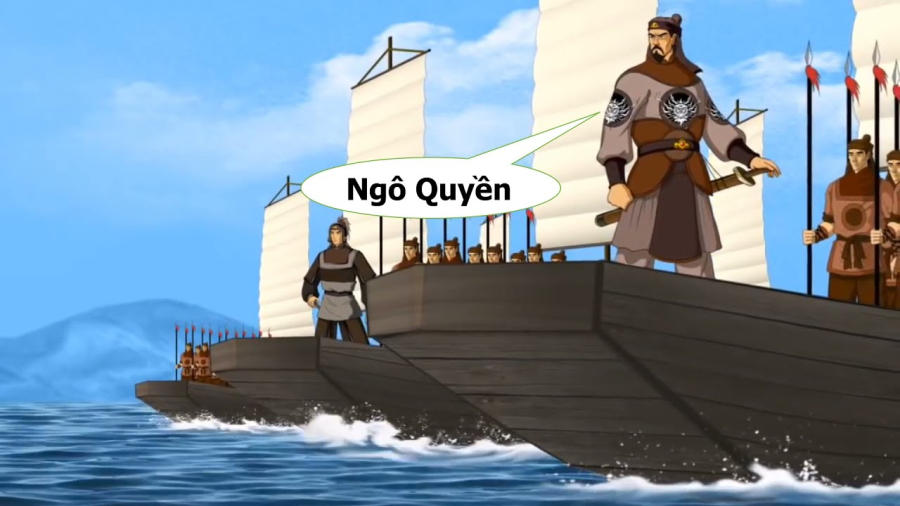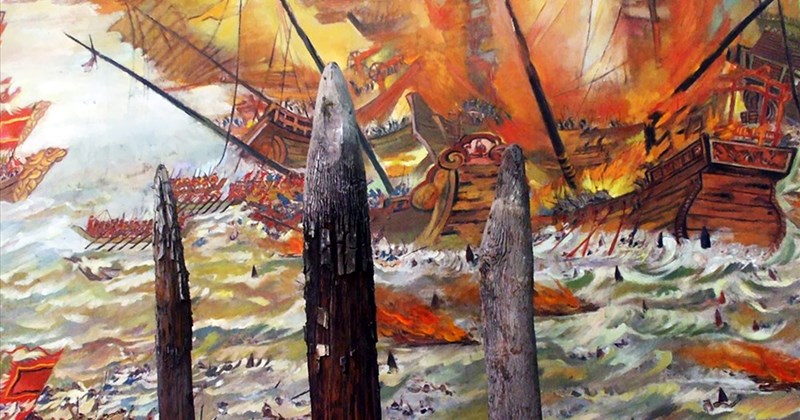Ngô Quyền (897 (some documents say 898) – 944), from Duong Lam village (now Duong Lam commune, Son Tay town, Hanoi). His father was Ngô Mân, who held the position of Châu Mục of Duong Lam. Since childhood, Ngô Quyền has been immersed in the patriotic traditions of his homeland.
Ngô Quyền was the first king of the Ngô dynasty in our country. He led our army to defeat the Southern Han army on the Bach Dang river in 938, ending over 1,000 years of Chinese dominion and opening up a new era of independence and autonomy for the country.

In China, in 907, the Tang dynasty collapsed. The feudal warlords in the northern region both annexed and destroyed each other, while seizing every opportunity to expand their territory through invasive military campaigns.
The king of the Southern Han, Lưu Nghiễm (later changed to Lưu Cung), named his country Đại Hán with ambitions to continue the expansionist dream of the early Tang Empire. The main direction of Southern Han’s expansion was the south, targeting our country, a rich land in a strategically important position in the Southeast Asia region, which had just emerged from over a thousand years of Chinese rule.
In pursuing this expansionist dream, in 930, the king of the Southern Han launched the first invasion. They defeated the Khuc family’s regime and captured the Dai La fortress. In 931, a general from the Khuc family, Dương Đình Nghệ, raised an army from Chau Ai and quickly defeated the enemy, driving them out of our country and restoring national sovereignty.

In 937, Dương Đình Nghệ was assassinated by Kiều Công Tiễn, who wanted to usurp the position of Tiết Độ sứ. Kiều Công Tiễn sent someone to seek help from the Southern Han. Taking advantage of this opportunity, the Southern Han launched a second invasion.
This time, the Southern Han king sent his son, Prince Giao Vương Lưu Hoằng Tháo, to lead a naval force to invade our country. The Southern Han king himself led his army to the border to provide support and prepared to respond when necessary.
When Hoằng Tháo was just a “little child”,
At the beginning of the 10th century, although the Khuc family held the title of Tiết Độ sứ, they had already started to establish autonomy. Then came Dương Đình Nghệ, who managed the affairs of the country but was later killed by Kiều Công Tiễn. Ngô Quyền, as a general and the son-in-law of the Dương family, led an army to punish the traitors. Kiều Công Tiễn couldn’t resist and sought help from the Southern Han.
The Southern Han king had long been longing for southern expansion, so he seized this opportunity to help Kiều Công Tiễn and appointed his son, Hoàng Tháo, as the naval commander to advance into our country through the Bach Dang river. The Southern Han king himself personally moved his army to the border to provide support and created the perfect setting for his son’s success.
When Hoàng Tháo was just a “clever child”
According to Đại Việt sử ký tiền biên, when they received the offer of assistance from the Kiều family, Lưu Cung sought advice from Tiêu Ích, who advised him, “Duong is a treacherous place, and Ngô Quyền is a formidable man, so do not underestimate him.” Unfortunately, his advice was not strong enough to overcome the expansionist ambitions of the Southern Han.
Knowing the enemy and ourselves, the great victory of Bach Dang
Ngô Quyền, with his military talent and “knowing the enemy and ourselves,” had the confidence to believe that “the clever child” Hoàng Tháo must have a strong desire to win, so he set a trap to lure him in, using his fresh army to defeat the tired enemy. He had wooden stakes with iron tips secretly embedded in the bed of the Bach Dang river, so that when the enemy ships advanced with the rising tide, they would be easily subdued. There was no better plan than that.
According to Việt sử như Toản, when the enemy ships arrived at Bach Dang, “wait for the tide to rise and let the enemy’s naval force advance, then immediately engage in battle, pretending to be losing and fleeing, so that the enemy pursues us. When the tide rapidly recedes, the enemy ships all hit the sharp wooden stakes and capsize. Ngô Quyền, taking advantage of his victory, captured and killed Hoàng Tháo, and Nghiễm mourned, collected the remnants of the defeated army, and returned home.”
Having suffered defeat and lost his son, the Southern Han king was like a turtle retracting its head, shedding tears of sorrow for his lost child, retreating and keeping his own army but no longer daring to act as a “ruling court” as planned. It was the exact scene described in Đại Nam quốc sử diễn ca:
The Battle of Bach Dang shook the world,
Hoàng Thao was lost, Kiều Công bowed his head.
The victory of Bach Dang happened in just one day, bringing independence and autonomy to the nation, ending over 1,000 years of Chinese domination. Its significance is immense, as stated in the Việt sử đại toàn: “The Battle of Bach Dang laid the foundation for the restoration of national unity in the future.” Phan Bội Châu, in his Việt Nam quốc sử bình diễn ca, called Ngô Quyền the “First Restorer” of our country.
In the Thoát Hiên epic poem, Đặng Minh Khiêm wrote about Ngô Vương Quyền as follows:
The Battle of Bach Dang brought silent fame,
Laying the foundation for the vương (king’s) career and ending hostility.
Only then do we truly understand the significance of that one-day battle for the more than a thousand years of previous Chinese rule and the dynasties that followed. The Battle of Bach Dang is truly worthy of the statement in the Việt sử đại toàn: “The Battle of Bach Dang laid the foundation for the restoration of national unity in the future.”
“Creating Lasting Memories: 10 Tips for Strengthening the Father-Child Bond”
Are you looking for effective ways to create a strong and close relationship with your child? If so, this article is for you! Find out 10 creative ways to nurture the father-child bond and make the relationship between you and your child more meaningful. These simple tips can help you create a special bond with your child and build strong emotional ties.





































